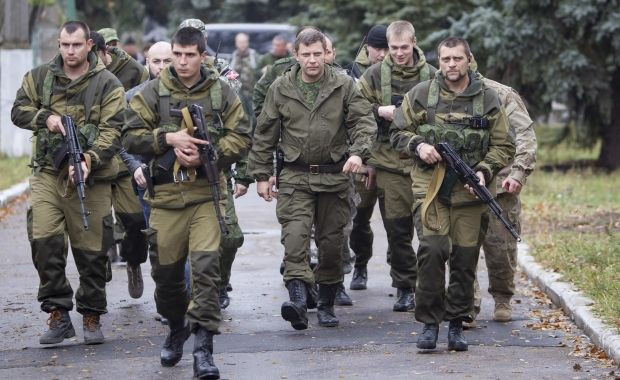Pro-Russian Separatists In Donetsk And Luhansk Now Willing To Remain Part Of Ukraine

Pro-Russian separatist leaders in the contested regions of Donetsk and Luhansk are now prepared to remain part of Ukraine under a specially recognized status, according to Ukrainian media, a move which has full support from Russian President Vladimir Putin. The status, which would be codified in amendments to the new Ukrainian constitution, would mark the end of efforts to make the self-proclaimed "people's republics" independent states, or have them annexed by Russia. The likely scenario is that they would become semiautonomous regions, but still part of the sovereign state of Ukraine.
While the the text of the constitutional amendments says only that "some regions with special status (or their associations) are an integral part of Ukraine," parliament would pass laws declaring which regions, cities and towns inside the regions will be given that status.
However, disagreement about the current ceasefire, which is being breached almost daily, persists between the two sides and hampers any progress on the status issue. Rebel leaders have demanded that Ukrainian government forces respect the Minsk II agreement, which came into force on Feb. 15 this year, before they can fully agree to autonomous status. Kiev has said exactly the same of the rebels.
The text of the proposed amendment, which has been published by pro-rebel media and Ukrainian news agencies, allows the leaders of the Luhansk People's Republic and Donetsk People's Republic, Igor Plotnitsky and Alexander Zakharchenko respectively, to retain their posts.
"Senior officials in charge of the executive branch on the territory of individual regions of Donetsk and Luhansk regions on the date of adoption of these amendments to the Constitution of Ukraine shall continue to exercise their powers until the termination of powers in accordance with the procedure established by the acts of individual regions with special status in Donetsk and Luhansk regions," the text reads.
Putin, whose army is supporting the separatist militias -- a charge he denies -- has already said he supports the idea that both breakaway regions should remain as part of Ukraine, which has been fighting a yearlong war with the rebels. Some analysts say Putin's chief reason for supporting autonomy rather than independence is that he is keen to avoid taking on the economic burden of rebuilding the war-torn region and being financially responsible for its people. Eastern Ukraine is among the poorest parts of a nation that is among the poorest in Europe; Ukraine's gross domestic product per capita is around $3,900 -- just one-ninth of the European Union's average.
© Copyright IBTimes 2025. All rights reserved.






















